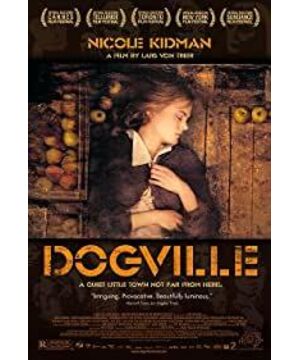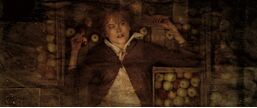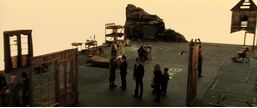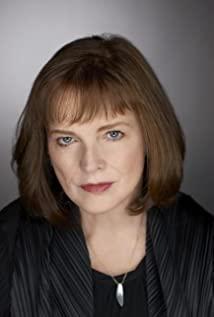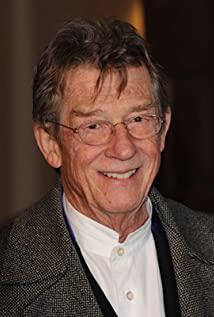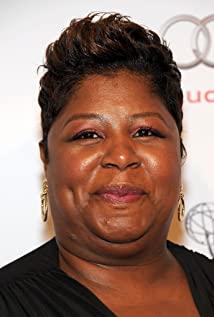This movie of Dog Town is the only movie I saw halfway through and felt that I couldn't bear to watch it again. It was also the most shocking and terrifying movie I've seen this year. After watching it, I felt very heavy. There wasn't a single horror scene, and even the narration was The tone of the documentary, but definitely a chilling horror film.
When analyzing the movie, I would like to first analyze the three main characters in the movie in order: the town resident, the male protagonist, and the female protagonist.
The first is the townspeople. Obviously, the residents in this movie are the incarnation of "evil", and arrogance, jealousy, greed, lust, etc. almost cover the seven deadly sins. But at the beginning of the film, it definitely didn't feel like this to the audience. Instead, it created a leisurely and comfortable town. The villagers were self-sufficient and lived a dull and leisurely life, until the arrival of the heroine broke this comfort. At first, there was a debate about whether to take in the heroine. Almost all the residents except the hero were against it, which is understandable, but the gentleness and kindness of the heroine and her hard work gradually won the town. The residents' favor, she can stay. But at the Fourth of July dinner, things started to change. The police came and put a robbery charge on the woman's wanted list. It's just amazing that the police said the robbery happened two weeks ago, and the heroine had been in town two weeks ago. Still, the townspeople felt uneasy, and where did this unease come from? Fear of the heroine? Obviously not. They all knew that the heroine could not commit the crime, but they still forcibly increased the "risk" of keeping the heroine, so the residents began to redouble their orders to the heroine, but this did not satisfy them. Be more demanding, and ask for more as a matter of course, because once a person becomes greedy, there will be no contentment. And the arrival of the next police car triggered another hidden price - the heroine's body was also enslaved, and Chuck raped her under the threat of reporting. The townspeople are also increasingly dissatisfied with the heroine, including Mayinger who was angry because the heroine ran through her bush, Liz was jealous of the closeness of the hero and heroine, Vera because the heroine educated her children and thought she Seduce their husband Chuck and get angry, etc. We can see that the tone of their speech to the heroine at this time is already a loud scolding, as if the heroine is a lowly person who owes them a debt. After the heroine escaped and failed to escape once, the residents put shackles and chains on her, and then enslaved her endlessly. She acts as a cow and a horse for everyone during the day, and becomes a sex slave for the men at night. The attitude of the town residents towards the heroine has changed dramatically from the beginning to the present. I made excuses until everything was taken for granted, and I didn’t think there was anything wrong with it. Faced with the accusation of the heroine, I shamelessly denied it, and finally gave up the heroine so that I could never face my conscience. Painful price.
Second is the male lead. The reason why the male protagonist is separated from the other residents is because he is the only one among them who has not directly enslaved the female protagonist, but he has always been an incarnation of hypocrisy and cowardice. The atrocities stand on the sidelines, he believes that his moral sense is stronger than others, and he is unwilling to join forces, but he has never taken any actual actions, and when it comes to his own interests, he can betray others mercilessly, and he will betray them afterwards. Find a noble reason to escape for yourself. In the first half of the paragraph, when he proposed on behalf of the town residents to double their labor and deduct wages, it was a hint that his essence was no different from other residents, and that he would eventually join them. Another hint is that the male protagonist has repeatedly expressed his desire for the female protagonist's body but cannot be satisfied. This is the direct cause of his betrayal of the female protagonist, and it is also where his cowardice lies. , let alone asking for something else. When all the men in the town took the female lead as the object of sexual venting, the male lead thought that since they have already done it, why can't we do it? We are in love, and you should be willing to dedicate yourself to me. This kind of cosmic honey god logic also shows his hypocrisy and filth at a glance. It is not that he can't get the female lead's body, but he feels that the female lead should be willing to give her body to him but he doesn't. This is the The point that really made him feel broken. And the fundamental reason is as mentioned above, he is a hypocritical person, the heroine exposed this in front of him, the heroine saw through his true thoughts, maybe he also thought about bullying her with the town residents , to join them, just can't let go of his "superior arrogance", it is completely unacceptable to be seen through as a hypocrite, the male protagonist feels that his self-esteem has been insulted, he is angry, not because he feels wrongly accused , but because these accusations are right, he can no longer look directly at the heroine, that will only make him see the real and ugly self, so he betrays the heroine. When the gang came, the male protagonist said with a flattering face, "The whole town is at your disposal" , and trying to ask the gang for money, and a bunch of fake justice words behind, the ugly face almost overflows the screen. And when he finally realized that something was wrong, he called the heroine out and said he was afraid, but there was a reason, all of this was beyond his imagination, and it was educational. The male protagonist didn't forget to make excuses for himself until the end, and even when he was about to die, he was still stubborn. Like all other residents, he didn't realize what he did wrong at all. Everything has a reason, and the responsibility lies with others. There is no doubt about his noble personality, so in the end, the noble male protagonist also died under the gun of the female protagonist.
Lastly is the heroine. If there are other "evil" in the movie besides the behavior of the town residents, then this evil is the heroine herself. The problem with the heroine is that she has always used unreasonable kindness to forgive and tolerate others. This is actually from a superior perspective, feeling that others cannot reach her realm, so she can be forgiven, and this is arrogance. As her father put it: "You take this prejudice that no one in the world has attained the same moral level as you, so you exonerate them, I can't think of anything more arrogant, you used to The excuse for forgiving others is something you will never use on yourself to forgive yourself. You can have kindness, but you must maintain the same standards for yourself and others. The punishment for your own mistakes should be the same for others. The punishment, everyone should be responsible for their actions, and you don't even give them this opportunity, it's just arrogant." So in the end, the hostess got out of the car and went to the same standard as his father said. Measure the town residents and herself, from their point of view, she may do the same, and may also do all kinds of dirty behaviors, but she absolutely can't find any reason to justify herself, and this is the town residents What he's been doing all along: defending himself, putting all the blame on others, and shamelessly devouring others. So she has a final decision, and the last wave of the male protagonist's defense undoubtedly pushed herself into the fire pit again, making her say: "If the world lacks any town, it will be better. If you don't, then it's this town, fire on them." There is also a lot of controversy about the ending. Some people say that the heroine has followed her father's path with violence. To make this world a better place. I don't think the heroine's behavior can be defined by conventional analysis methods. From beginning to end, her strong endurance challenges my three views infinitely. As a gang boss, the daughter has no characteristics of a rich lady at all. It can be said that she has no dignity. He didn't roar piercingly when he was obscene or humiliated. No matter what angle he stood in, he could only explain it objectively, not subjectively. When the heroine's father came to the town and planned to take her back, the heroine's first reaction turned out to be refusal, which really surprised and puzzled me at the time. Her character never changed until she got out of the car and thought about it. No matter what the town people did to her, she always chose to forgive rather than be forced to forgive her. It is even more unacceptable to let her and her father commit the atrocities. And after she figured it out, she saw through the town The residents are ugly, "No, they haven't done well enough." The massacre of the whole town is not unexpected, but when the heroine said: "There is a family with children, start with the children first, let the mother watch and tell her If she can hold back the tears you stop, I owe her that." It did give me a chill behind my back. I believe she wants to make the world a better place, but human nature is complicated. When the machine guns swept the whole town, the heroine was sitting in the car and burst into tears in front of the blood. I think her mood at this time also It must be extremely painful, and just looking at this one move I think it's revenge, and it's also to let them experience the pain and torture they've endured, just like they only really feel fear when a murderer is sentenced to death , realize the preciousness of life.
Regarding how the tragedy was brewed, I think there are many reasons: the first is arrogance, which is the most important word in the whole film. The heroine's father arrogantly plunders the rights given to others by God, making the heroine want to escape from his clutches, hence the beginning of the film; the townspeople arrogantly pose as a benefactor, turning the heroine into their prisoner , their series of attitude changes seem to be inevitable according to the movie. People can never be satisfied when they are greedy. This is also the weakness of human nature; the male protagonist arrogantly thinks that he is more spiritual than others. The hypocrite, directly or indirectly pushed the heroine into the abyss; the heroine arrogantly used God's perspective to tolerate and forgive others indefinitely, without any resistance, so that her status gradually became infinitely low until she became a prisoner. The second is background. The background of the heroine given at the beginning of the film is a wanted criminal - at least in the eyes of the town residents. If they knew from the beginning that the heroine was the daughter of a gang boss, they just wanted to get rid of the shackles of the family. They won't enslave her like this, and it's different if they think the heroine is a wanted criminal - that puts themselves in the position of a savior, thinking that they risk the law to protect the inferior prisoner of the heroine, so they follow suit. With the arrival of the police car again and again, they looked down on the heroine more and more every time, and also forcibly raised their savior position higher and higher, so they also demanded more and more every time. The third is collective crime. When a person does bad things, he does bad things, and when a group of people do bad things, the bad things seem to become normal. Since they are all calling her like this and taking her body, why can't I do it? The sense of guilt caused by a collective crime will be far less than that of an individual, let alone a group of villagers who have never seen the world, so naturally they will not have firm principles and bottom lines.
A very interesting point is that when the heroine first came to Gou Town, almost no family in Gou Town needed her help, because everyone was self-sufficient, well-fed, and had a regular life. The heroine had almost no family. Where you can intervene, but forcibly find something to do. Later, when the residents proposed to make her work harder, there was actually nothing extra for her to do, but they felt unbalanced psychologically and needed to see the heroine compensate them more, even if these compensations were completely unnecessary. So the question is, if there is no police car, that is to say, there is no background of wanted criminals, and other conditions remain unchanged, will the fate of the heroine be different?
Finally, a little personal viewing experience (and Tucao):
1. The setting method of the stage play is really a bit incompetent. No matter what the director's purpose is, it must not be in line with the aesthetics of most audiences. During the viewing process, I imagined what it would be like if it was a real town. The conclusion is that My viewing experience must have been much better.
2. The three-hour movie is too long, and the whole first hour and a half was divided several times before watching it. Personally, I think many of the scenes are not that important, but they still played for a long time.
3. When I saw half of it, I actually knew that the heroine could not escape successfully, and the hero must be unreliable. The progress bar silently explained everything, but when I saw the heroine being transported back to the town, my My heart is still broken...
4. The image of the town residents can be fuller. Except for the male protagonist's personality characteristics, the residents are almost the same "evil". If the movie has to be so long, you can create a few more distinctive characters. For example, at the beginning, I strongly objected to the heroine staying, then I saw the heroine's hard work and praised her, and finally scolded the heroine as a lowly chameleon, etc., so that each resident has his own unique character to represent the society in the society. a certain group of people.
One of the most impressive moments in the film is at the Independence Day dinner, where the blind old man said to the heroine: "Grace, you've made Dougville a beautiful place, in fact, someone told me they Saw grumpy old Chuck on the street and he was laughing and I gotta say I never saw you laugh but I bet I can describe your smile because obviously your smile is the most beautiful in the world The flowers are as splendid as the flowers, and we are very proud to have you." Happiness and warmth permeated everyone's smiling faces, and the picture was full of joy. In the next second, the arrival of the police car sounded the bell of crime, and also decided the future fate of the town residents and the heroine.
View more about Dogville reviews


